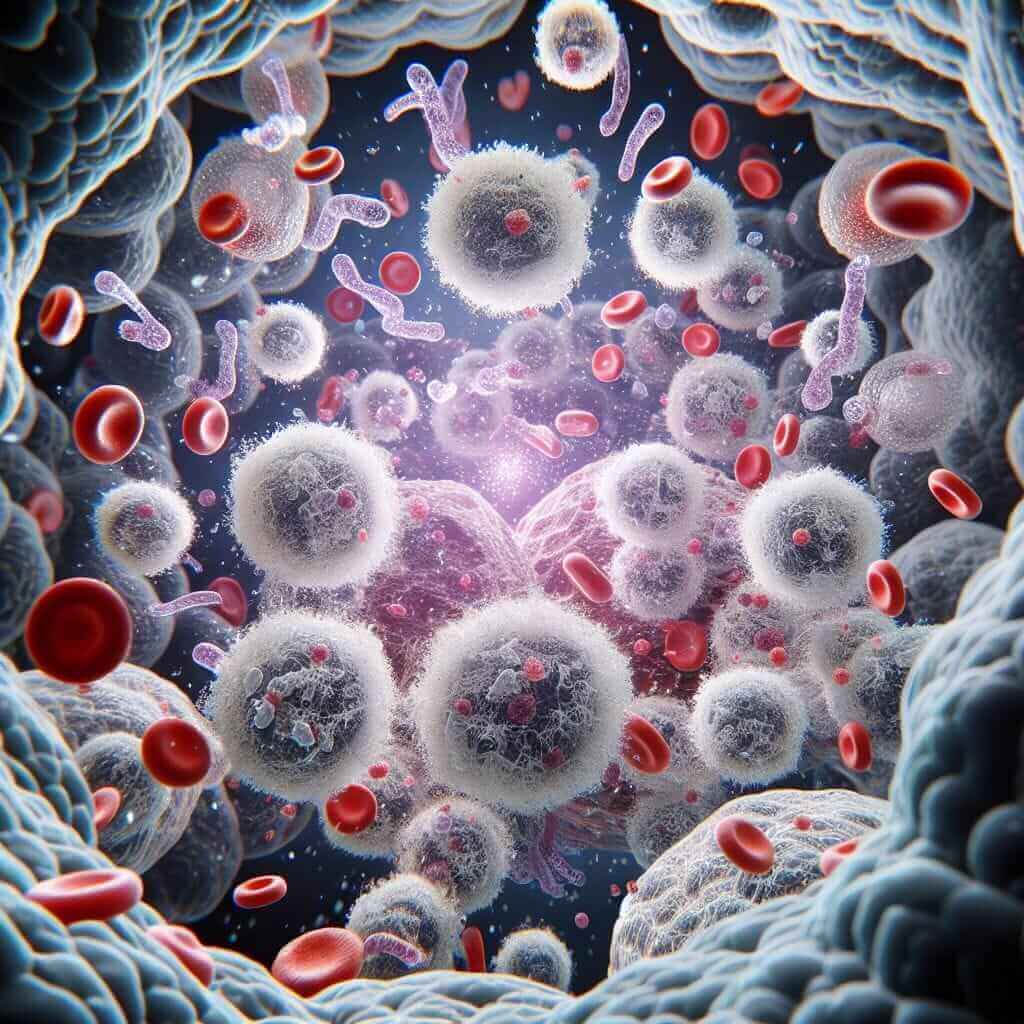“White blood cell” is a specialized term that falls under the category of health and medicine, a topic frequently appearing in the IELTS exam. Understanding this term and its related vocabulary is essential for achieving a strong score in both the listening and reading sections, and it can also be strategically used in the speaking and writing sections to demonstrate a wider range of vocabulary.
Nội dung bài viết
Understanding “White Blood Cell” and Related Terms
White blood cell (noun) /ˌwaɪt ˈblʌd sɛl/: Also known as a leukocyte ( /ˈluː.koʊ.saɪt/), a white blood cell is a type of cell that is part of the body’s immune system. White blood cells help the body fight infection and other diseases.
Here are some synonyms and related terms:
- Leukocyte: A general term for any type of white blood cell.
Example: Leukocytes are produced in the bone marrow. - Lymphocyte (noun) /ˈlɪm.foʊ.saɪt/: A type of white blood cell that plays a central role in the immune system. There are two main types of lymphocytes: B cells and T cells.
Example: Lymphocytes travel throughout the body, identifying and destroying pathogens. - Phagocyte (noun) /ˈfæ.ɡoʊ.saɪt/: A type of white blood cell that engulfs and destroys bacteria and other foreign substances.
Example: Macrophages and neutrophils are types of phagocytes. - Immune response (noun) /ɪˈmjuːn rɪˈspɒns/: The body’s coordinated reaction to the presence of a foreign substance, such as a virus or bacteria.
Example: White blood cells play a crucial role in the immune response. - Infection (noun) /ɪnˈfɛk.ʃən/: The invasion and multiplication of microorganisms such as bacteria, viruses, and parasites that are not normally present within the body.
Example: A high white blood cell count is often indicative of an infection.

“White Blood Cell” in the IELTS Exam
This topic is particularly relevant to the IELTS listening and reading sections, which often feature passages or dialogues related to health, biology, or medicine. You may encounter questions about the function of white blood cells, the different types, or their role in fighting diseases.
Applying “White Blood Cell” Vocabulary
Listening Section:
You might hear a lecture on the immune system or a conversation between a doctor and a patient discussing blood test results.
Example: “Your blood test shows an elevated level of white blood cells, which indicates that your body is fighting off an infection.”
Reading Section:
A passage might discuss the different components of blood or the body’s defense against diseases.
Example: “White blood cells, also known as leukocytes, are essential components of the immune system. They circulate throughout the body, identifying and destroying pathogens such as bacteria, viruses, and parasites.”
Speaking Section:
When discussing health or lifestyle choices, you can use this vocabulary:
Example: “I try to maintain a healthy lifestyle to support my immune system. This includes eating a balanced diet and getting enough sleep, which can help my body produce enough white blood cells to fight off infections.”
Writing Section:
You might be asked to write an essay about the importance of a strong immune system or the impact of stress on health.
Example: “Chronic stress can suppress the immune system, leading to a decrease in the production of white blood cells and making individuals more susceptible to infections.”
Idioms and Collocations
While there aren’t specific idioms related to “white blood cell,” you can use strong collocations:
- Boost the immune system: Regular exercise can help boost the immune system.
- Compromised immune system: People with compromised immune systems are more susceptible to infections.
- Strong immune response: Vaccinations work by triggering a strong immune response.
Conclusion
Mastering vocabulary related to health and the body is crucial for success in the IELTS. By understanding and being able to use terms like “white blood cell” and its related vocabulary accurately, you will be well-equipped to achieve a higher score on the exam. Continue to practice using these terms in context to improve your fluency and confidence.